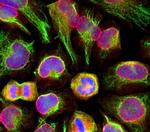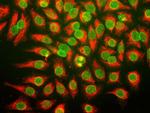Search Thermo Fisher Scientific
Invitrogen
Nuclear Pore Complex Monoclonal Antibody (39C7)
FIGURE: 1 / 2
Nuclear Pore Complex Antibody (MA5-33097) in ICC/IF


Product Details
MA5-33097
Species Reactivity
Host/Isotype
Class
Type
Clone
Immunogen
Conjugate
Form
Concentration
Storage buffer
Contains
Storage conditions
Shipping conditions
RRID
Target Information
The nuclear pore complex (NPC) serves as the sole bidirectional gateway of macromolecules in and out of the nucleus. Each NPC consists of ~1,000 protein subunits, termed nucleoporins, and totals to a molecular mass of ~110 Mda. NPCs maintain the integrity of the nuclear compartment by preventing macromolecules from freely diffusing in or out of the nucleus. (Annu Rev Biochem, 2019. PMID 30883195)
For Research Use Only. Not for use in diagnostic procedures. Not for resale without express authorization.
References (0)
Bioinformatics
Protein Aliases: 107 kDa nucleoporin; 133 kDa nucleoporin; 153 kDa nucleoporin; 155 kDa nucleoporin; 160 kDa nucleoporin; 205 kDa nucleoporin; 214 kDa nucleoporin; 35 kDa nucleoporin; 50 kDa nucleoporin; 62 kDa nucleoporin; 85 kDa nucleoporin; 88 kDa nuclear pore complex protein; 88 kDa nucleoporin; 93 kDa nucleoporin; 98 kDa nucleoporin; CAN protein, putative oncogene; CBP-interacting protein 4; FROUNT; Gene trap locus 1-13 protein; gene trap locus-13; GLFG-repeat containing nucleoporin; GTL-13; karyoporin; Mitotic phosphoprotein 44; MP-44; Nuclear envelope pore membrane protein POM 210; nuclear pore associated protein 60 kDa; nuclear pore complex 1; nuclear pore complex protein 88; nuclear pore complex protein hnup153; Nuclear pore complex protein Nup107; Nuclear pore complex protein Nup133; Nuclear pore complex protein Nup153; Nuclear pore complex protein Nup155; Nuclear pore complex protein Nup160; Nuclear pore complex protein Nup205; Nuclear pore complex protein Nup214; Nuclear pore complex protein Nup50; Nuclear pore complex protein Nup53; Nuclear pore complex protein Nup85; Nuclear pore complex protein Nup88; Nuclear pore complex protein Nup93; nuclear pore complex protein Nup98; Nuclear pore complex protein Nup98-Nup96; nuclear pore glycoprotein 62; Nuclear pore glycoprotein p62; Nuclear pore membrane glycoprotein 210; nuclear pore membrane protein 210; Nuclear pore protein gp210; Nuclear pore-associated protein 60 kDa-like; nuclear pore-associated protein 60L; nucleoporin 107kDa; nucleoporin 133; nucleoporin 133kD; nucleoporin 133kDa; nucleoporin 153kD; nucleoporin 153kDa; nucleoporin 155kD; nucleoporin 155kDa; nucleoporin 160kD; nucleoporin 160kDa; nucleoporin 205kDa; nucleoporin 210; nuclear pore membrane glycoprotein 210; nuclear pore membrane protein 210; nucleoporin 210kDa; nucleoporin 214kDa; nucleoporin 35kDa; nucleoporin 50 kDa; nucleoporin 50kD; nucleoporin 50kDa; nucleoporin 62kD; nucleoporin 62kDa; nucleoporin 85kDa; nucleoporin 88kDa; nucleoporin 93kDa; nucleoporin 98kD; nucleoporin 98kDa; Nucleoporin Nup107; Nucleoporin Nup133; Nucleoporin Nup153; Nucleoporin Nup155; Nucleoporin Nup160; Nucleoporin Nup205; Nucleoporin Nup210; Nucleoporin Nup214; Nucleoporin NUP35; Nucleoporin Nup50; Nucleoporin NUP53; Nucleoporin Nup62; Nucleoporin Nup75; Nucleoporin Nup84; Nucleoporin Nup85; Nucleoporin Nup88; Nucleoporin Nup93; nucleoporin Nup98; nucleoprotein 50; Nucleoprotein 50kD; Nup98-Nup96; NUP98/PHF23 fusion 2 protein; p105; P140; pericentrin 1; Pericentrin-1; POM210; Pore membrane protein of 210 kDa; preimplantation protein 2; Protein CAN
Gene Aliases: 160kDa; 1700030K07Rik; 2310006I24Rik; 2410008G02Rik; 2810011M03Rik; 35kDa; 3830404O05Rik; 4732457F17; 5330402E05Rik; 9830001L10; AA414952; AA589433; ADAR2; ADIR2; AI413123; AI426861; AI790512; AI836801; AI849286; ATFB15; AU020188; AU045898; AV248391; AW541137; B130015D15Rik; BC039282; C76801; C7orf14; C88147; CAIN; CAN; Cip4; D2H9S46E; D7Ertd649e; D930027M19Rik; FROUNT; gp190; GP210; Gtl-13; Gtl1-13; Gtl13; hNUP133; HNUP153; IBSN; KIAA0023; KIAA0095; KIAA0197; KIAA0225; KIAA0791; KIAA0906; mermaid; mKIAA0197; mKIAA0225; mKIAA0791; MP-44; MP44; N153; N155; NIC96; NO44; NP44; Np62; NPAP60; NPAP60L; NPHS11; NPHS12; NPHS13; NUCZINK; NUP107; NUP120; NUP133; NUP153; NUP155; NUP160; NUP196; NUP205; NUP210; NUP214; NUP35; NUP50; NUP53; NUP62; NUP75; NUP84; NUP85; NUP88; NUP93; NUP96; NUP98; Nupc1; p62; PCNT1; POM210; Prei2; PRO1146; PSEC0245; RGD1304977; Rtp60; SNDI
UniProt ID: (Human) P57740, (Human) Q8WUM0, (Human) P49790, (Human) O75694, (Human) Q12769, (Human) Q92621, (Human) Q8TEM1, (Human) P35658, (Human) Q8NFH5, (Human) Q9UKX7, (Human) P37198, (Human) Q9BW27, (Human) Q99567, (Human) Q8N1F7, (Human) P52948, (Rat) O08587, (Mouse) Q8BH74, (Mouse) Q8R0G9, (Rat) P37199, (Mouse) Q99P88, (Mouse) Q9Z0W3, (Rat) P11654, (Mouse) Q9QY81, (Mouse) Q80U93, (Rat) Q68FY1, (Mouse) Q8R4R6, (Mouse) Q9JIH2, (Rat) P17955, (Mouse) Q63850, (Rat) Q4QQS8, (Mouse) Q8R480, (Mouse) Q8CEC0, (Rat) O08658, (Mouse) Q8BJ71, (Rat) Q66HC5, (Mouse) Q6PFD9, (Rat) P49793
Entrez Gene ID: (Human) 57122, (Human) 55746, (Human) 9972, (Human) 9631, (Human) 23279, (Human) 23165, (Human) 23225, (Human) 8021, (Human) 129401, (Human) 10762, (Human) 23636, (Human) 79902, (Human) 4927, (Human) 9688, (Human) 4928, (Rat) 25497, (Rat) 116555, (Mouse) 103468, (Mouse) 234865, (Rat) 292085, (Rat) 25281, (Mouse) 218210, (Rat) 117021, (Mouse) 170762, (Mouse) 59015, (Rat) 311182, (Mouse) 70699, (Rat) 362335, (Rat) 58958, (Mouse) 54563, (Mouse) 227720, (Rat) 296634, (Rat) 295692, (Mouse) 69482, (Mouse) 18141, (Rat) 65274, (Mouse) 18226, (Rat) 287830, (Mouse) 445007, (Mouse) 19069, (Rat) 113929, (Mouse) 71805, (Rat) 291874, (Mouse) 269966, (Rat) 81738
Molecular Function:
![]() transporter
transporter
![]() scaffold/adaptor protein
scaffold/adaptor protein
![]() structural protein
structural protein

Performance Guarantee
If an Invitrogen™ antibody doesn't perform as described on our website or datasheet,we'll replace the product at no cost to you, or provide you with a credit for a future purchase.*
Learn more
We're here to help
Get expert recommendations for common problems or connect directly with an on staff expert for technical assistance related to applications, equipment and general product use.
Contact tech support
